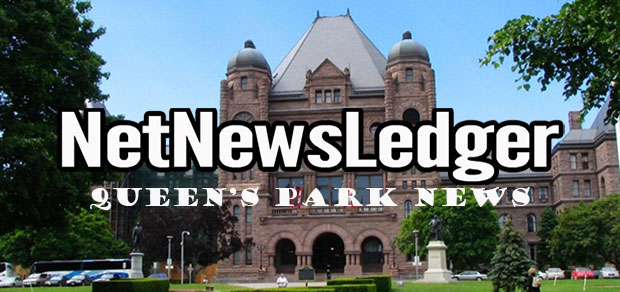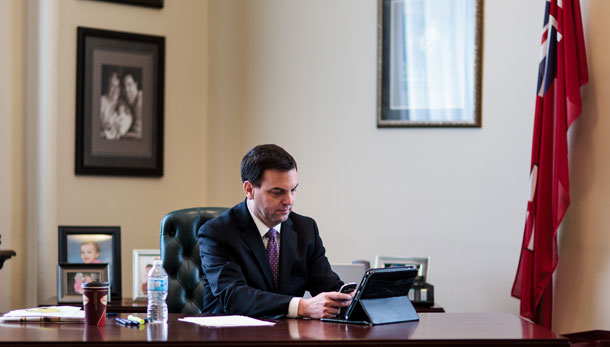 QUEEN’S PARK – Leaders Ledger – Premier Dalton McGuinty continues to work toward a settlement with Ontario teachers. The following is an open letter from Ontario Premier Dalton McGuinty to Ontario teachers and education support staff:
QUEEN’S PARK – Leaders Ledger – Premier Dalton McGuinty continues to work toward a settlement with Ontario teachers. The following is an open letter from Ontario Premier Dalton McGuinty to Ontario teachers and education support staff:
“I want to begin by thanking you, our teachers and education support staff, for the work you do every day — educating and inspiring our students and making our schools great places to learn for all.
“Last year was a challenging year in Ontario education. But the reality is that the environment we’ve faced in education does not exist in isolation.
“All Ontarians have been working hard to overcome a stubborn deficit left over from the global economic recession. Together, we’ve kept working to create jobs in a world economy that’s still growing slowly.
“As part of meeting this challenge, together, we asked all public service employees to negotiate two-year wage freeze agreements — allowing us to meet our fiscal targets while protecting jobs and public services.
“In fact, over 90,000 public servants have now negotiated wage freeze agreements and found ways of balancing their interests with the province’s priorities.
“This includes over 55,000 teachers and support staff who stayed at the table and negotiated agreements that are fair and reasonable, both for them and for all Ontarians. Many schools are having a full and successful academic year. And it’s encouraging that over 65 agreements have been reached and ratified at the local level.
“Just a few days ago, the Canadian Union of Public Employees reached a template agreement that freezes pay while recognizing the important work their 55,000 members do in our schools; an agreement reached after 30 hours of negotiating over the holiday season.
“In education, our government chose to keep funding focused on the classroom. Instead of pay raises, we chose to protect programs — such as full-day kindergarten and small class sizes — and to protect the jobs of 10,000 teachers and 10,000 support staff.
“We started negotiations in the education sector last February, hoping we could find common ground. We expected difficult discussions, but we were disappointed that some parties chose to walk away from negotiations, never to return.
“We were grateful to those who chose to stay at the table and find a path forward with us. Those parties — OECTA and AEFO in particular — persuaded the government to move away from our original offer and toward agreements they considered to be more in the interests of their members. Those compromises will now serve as the terms for contracts moving forward.
“Pay: We came to the table asking for a pay freeze and no grid movement. OECTA agreed to the pay freeze but spoke passionately and convincingly on behalf of younger teachers against a grid freeze. So we agreed to grid movement for eligible teachers, which will be offset with unpaid days.
“Sick Days: We came to the table with an offer of six sick days a year, down from 20. But OECTA convinced the government that teachers spend time with kids who are sick and, therefore, they get sick more often. So we agreed to 10 sick days and a modernized short-term disability plan that provides for 120 days annually and a one-year roll over of unused sick days to top up the 90 per cent payment.
“Maternity Plan: There is now a much-improved plan that no longer requires the use of sick days and is available to all in the education system.
“Retirement Gratuities: We came to the table saying that the practice of paying-out banked sick days as retirement gratuities had to come to an end. Our partners made a compelling argument that this should be grandfathered out. We agreed, so those teachers in boards with retirement gratuity plans and with less than 10 years teaching experience will have their days paid out at 10 cents on the dollar; those with more than 10 years teaching experience will see their retirement gratuities protected.
“These terms are fair given the province’s circumstances. The Minister of Education will have more to say tomorrow about the path forward for your new collective agreements.
“Our preference is and has always been negotiated settlements. But after 10 months, the bargaining deadline has passed. Ontarians expect, rightly, that uncertainty in education will not continue indefinitely — and that our government will show a clear determination to balance the budget by 2017-18.
“I think it’s important to remember that as much as 2012 had its challenges, we’ve overcome much bigger challenges in education in Ontario. In 2003, as student achievement stagnated, many parents were losing confidence in publicly funded education and many teachers felt demoralized.
“Today, Ontario teachers are among the highest paid in North America and have better working conditions. And you are worth every single penny. Our test scores are way up. So are high school graduation rates. And that means many more young Ontarians are going on to postsecondary education than ever before — which is vital in a global economy that is more competitive than it has ever been. And now, because of the steps we’re taking together, we’re going to see education funding on a sustainable footing to support strong public education in the future.
I know there’s a tremendous amount of goodwill among our teachers and in our schools — and that you recognize Ontario’s economic challenges and the vital role you play in preparing our young people to seize new opportunities. And I remain confident that Ontario’s teachers will do what you’ve always done — strive for excellence in the classroom so that our students continue raising their achievement and getting the best possible start in life”.
Yours truly,
Dalton McGuinty





